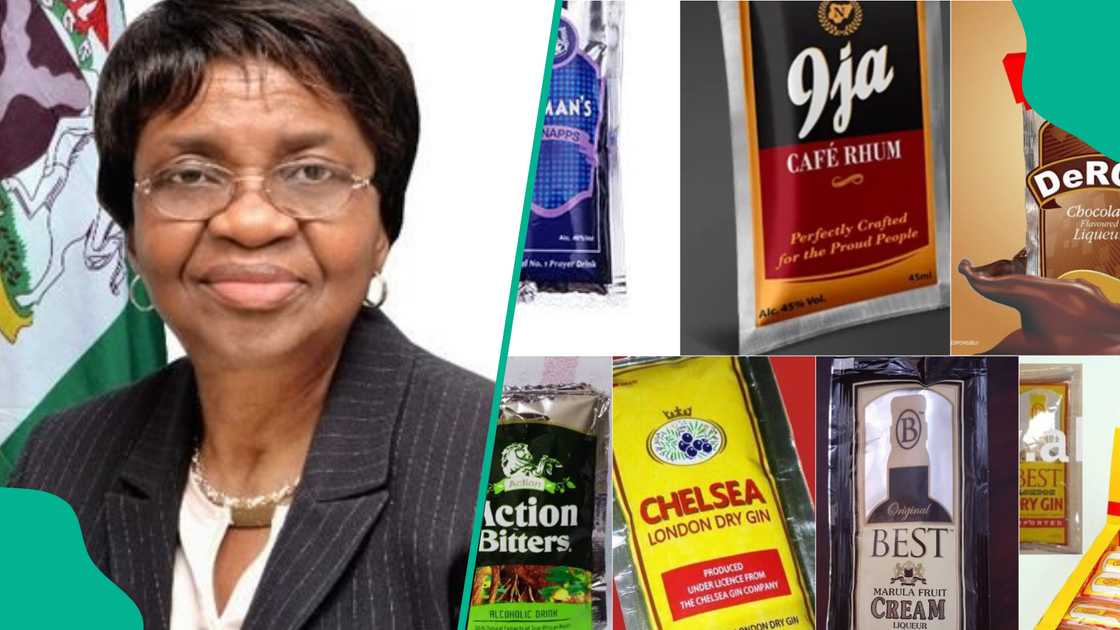NAFDAC Announces Date to Start Enforcing Ban on Alcohol in Sachets, Small Bottles
- The National Agency for Food and Drug Administration and Control has set December 2025 as the final deadline to enforce total ban on alcohol in sachets and bottles below 200ml
- The Agency says the ban is protective, not punitive, citing rising cases of addiction, domestic violence, and road accidents
- The announcement follows a directive from the Nigerian Senate, which ordered NAFDAC to enforce the ban without further delay
Abuja, Nigeria - The National Agency for Food and Drug Administration and Control (NAFDAC) has announced that it will begin full enforcement of the ban on the production and sale of alcoholic beverages packaged in sachets and bottles smaller than 200 millilitres by December 2025.
The agency’s Director General, Prof. Mojisola Adeyeye, made the announcement during a press briefing in Abuja on Tuesday, November 11.

Source: Facebook
She stressed that the move aims to curb the rising misuse of cheap alcoholic drinks among youths and commercial drivers.
According to her, the easy access to such beverages has been linked to increasing cases of domestic violence, road accidents, school dropouts, and other social vices.
“The proliferation of high-alcohol-content beverages in sachets and small containers has made such products easily accessible, affordable, and concealable, leading to widespread misuse and addiction among minors and commercial drivers,” Adeyeye said.
The announcement follows a directive from the Nigerian Senate, which ordered NAFDAC to enforce the ban without further delay.
Lawmakers insisted that no new extensions will be granted beyond December 2025, citing concerns over the public health implications of unregulated sachet alcohol consumption.
NAFDAC warns manufacturers
Prof. Adeyeye confirmed that the latest Senate resolution marks the final phase of the withdrawal process, stressing that manufacturers, distributors, and retailers must begin full compliance ahead of the enforcement date.
She also recalled that NAFDAC had earlier signed a Memorandum of Understanding (MoU) with key industry players to phase out the production of sachet alcohol, but several deadlines had been shifted due to appeals from manufacturers.
“This ban is not punitive; it is protective,” she said. “It is aimed at safeguarding the health and future of our children and youth. The decision is rooted in scientific evidence and public health considerations.”
“We cannot continue to sacrifice the well-being of Nigerians for short-term economic gain. The health of a nation is its true wealth,” Adeyeye added.

Source: Twitter
The ban on sachet and small-bottle alcohol was first proposed in 2018, following growing evidence linking such products to addiction among underage drinkers and reckless behaviour among drivers.
Public health experts have long argued that the small-sized packaging encourages overconsumption, as the drinks are cheap, easily concealed, and widely available, especially around schools and motor parks.
NAFDAC issues public alert over falsified antibiotic
Legit.ng earlier reported that NAFDAC has issued a public alert over a suspected substandard and falsified antibiotic, BETACLOX, found in Nigeria’s drug supply chain.
Investigations revealed the product carries a fake registration number and misleading packaging details, raising serious concerns about its authenticity.
Healthcare professionals and consumers are urged to report any suspicious medicines to NAFDAC immediately.
Source: Legit.ng




